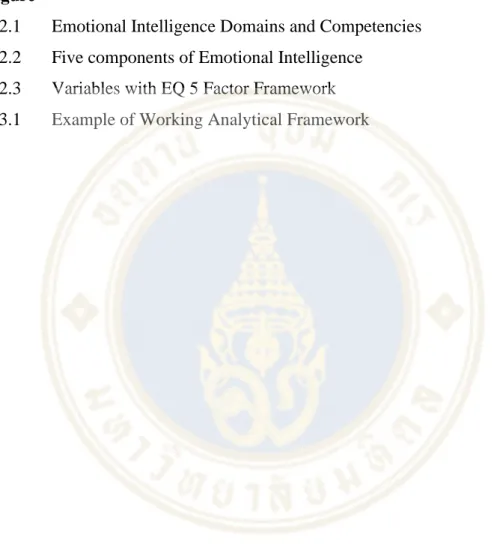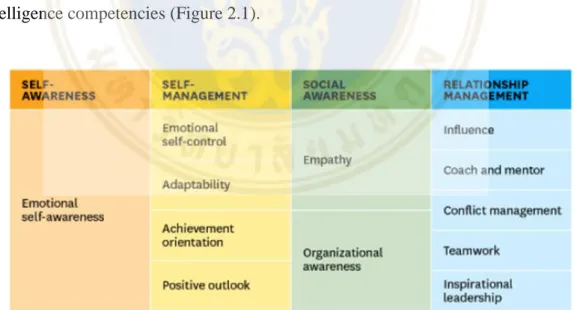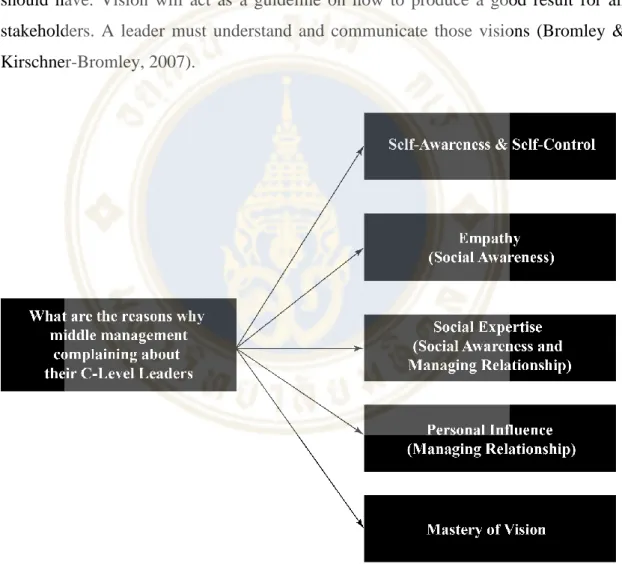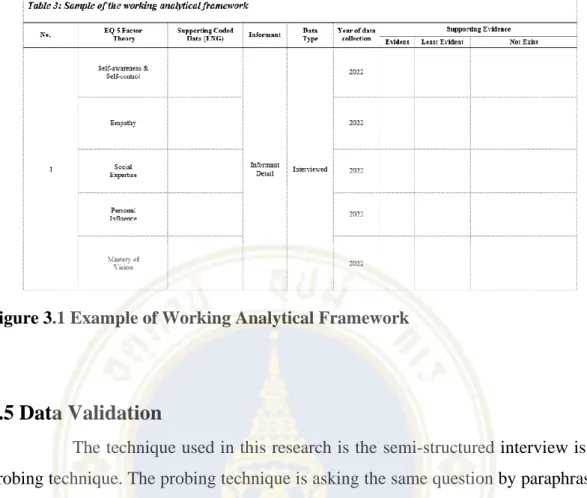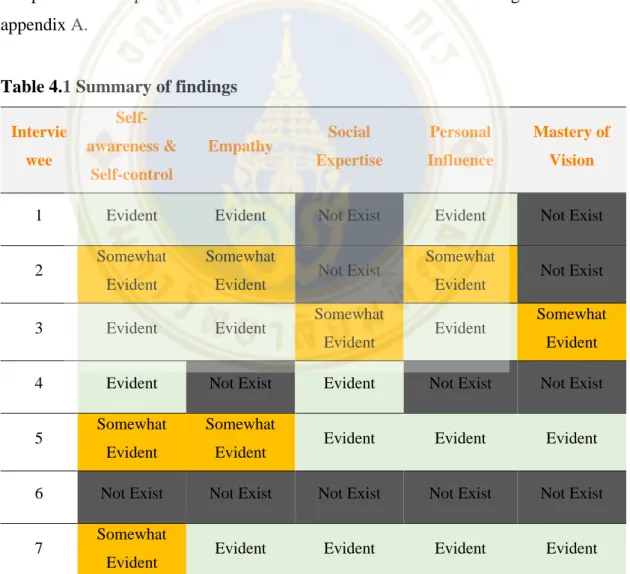His advice on how to conduct the interview and analyze and interpret the result in the working analytical framework is very useful. This research paper aims to explore the root causes why middle management often complain about their C-level executive. To understand the issue more clearly and systematically, the theory of EQ-5 Factor will be applied.
Each component of the theory will be discussed and used to identify the gap. The interview result shows that missing one or two components of the EQ will not make the staff complain. Not only do you need to have the ability and ability or IQ, but you also need to have EQ or sometimes referred to as "Emotional Intelligence." Emotional intelligence has been extensively studied on board, but not much in Thailand.
The ability to be aware of your emotions and to recognize those around you is considered to have emotional intelligence. In this research, we'll explore the root causes of complaints, what leaders lack, and what characteristics people expect to see in their leaders. We will apply the EQ 5 factor theory and use five main factors in the theory as variables in this paper to identify the gap and provide recommendations on how to fill these gaps.
The next part of this research will introduce and discuss how the concept of emotional intelligence evolved from IQ or intelligence quotient to EQ or emotional intelligence.

LITERATURE REVIEW
Emotional Intelligence
Emotional intelligence describes our ability to understand our own and others' emotions, to motivate ourselves and manage emotions effectively in ourselves and in our relationships (Goleman, 2000). EQ is said to be embodied with you when you were born, genetically, and part of EQ you can develop throughout your life from experience and training. The most effective leaders are alike in one crucial way: They all have a high degree of what has come to be known as emotional intelligence.
Despite having the best education or unlimited ideas, one can only be a good leader if one has emotional intelligence. The statement is true as we have all experienced a point where we think our boss is intelligent but not the type of manager we want to work with. This aligns with the results of the LinkedIn Learning survey, where they gathered information from 2,968 professionals about the: Most frustrating quality they have experienced in a manager.
The interesting result from the study further shows that if the manager portrayed one of these frustrating behaviors, it could lead to employees quitting their jobs. Emotional intelligence is essential as it is one of the core competencies of being a good leader.
Five Emotional Intelligence Domains
- Self-awareness and Self-control
- Empathy (Social Awareness)
- Social Expertise (Social awareness and managing relationships) Once you are aware of those around you, it is also important to manage
- Personal Influence (Managing relationships)
- Mastery of Vision
This was further developed in the aspect of leadership and framed in EQ 5 Factors framework. This means that you know what kind of person you are and how you will react in certain situations. Self-awareness also means knowing your core values and understanding the effect of compromising your core values.
Knowing how you will react if someone goes against what you believe in is essential. Once you are aware of yourself and your emotions, you must also be able to control them and be the master of your emotions. It is believed that self-awareness and self-control are the first doors open to other traits in the EQ component (Lynn, 2004).
It tells us how we see the world and predicts how we respond to it. Social expertise means that you can read and sense how society or the people around you feel. If you can read social situations, you can use empathy, express feelings, and deal with conflict in ways that build relationships.
You will be able to show care, concern and support, leading to a strong network of relationships. It is the ability to influence others to follow in the direction you want.
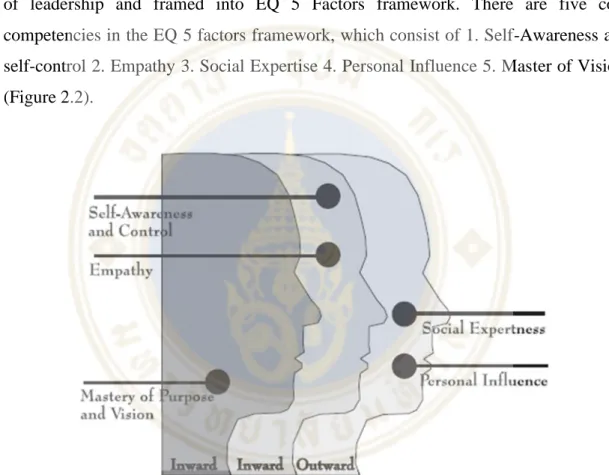
Propositions for the Qualitative Research
RESEARCH METHODOLOGY
- Research methodology
- Sample and data collection
- Interview Questions
- Questions regarding Empathy (Social-Awareness)
- Questions regarding Social Expertise (Social-awareness and managing relationships)
- Questions regarding personal influence (Managing relationship) 4. Please tell me the time when your boss inspires you
- Questions regarding Mastery of Vision
- Data analysis method
- Data Validation
The interview lasts approximately 30 minutes and is conducted via Zoom or telephone, depending on the interviewee's choice. At the beginning of the interview, the interviewer explained to the interviewee the purpose of conducting this research interview. The five main questions according to the EQ-5 factor theory are listed below, as well as additional questions.
How did the leadership ability of your leader and senior managers influence how you thought, felt and behaved in terms of change?". If yes, how he or she acts or does to achieve this vision goal. Etc. al. , (2021) elaborated on the working analytical framework that “is a technique of analysis called.
Using the coding table, the researcher will look for the commonality of the gap according to the EQ-5 Factor theory framework and make a recommendation accordingly. The probing technique asks the same question by paraphrasing it to confirm that the interviewee's original answer is still valid and to avoid bias. In the next chapter, each interview will be transcribed and analyzed with a working analytical framework and interpreted according to the EQ-5 Factor Theory framework.
The findings of the working analytical framework will be discussed in the last chapter and recommendations provided.
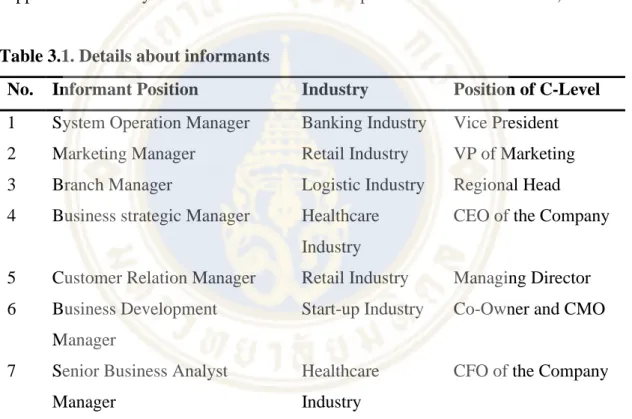
RESEARCH FINDINGS
- Self-awareness and Self-control
- Empathy (Social Awareness)
- Social Expertise (Social awareness and managing relationships)
- Personal Influence (Managing relationships)
- Mastery of Vision
This may be due to the age, as most of the C-level Executives are around 40-50 years old. On the other hand, when it's not an unexpected situation, I can feel that she's prepared and thought about it. This is very evident in the meeting where he will raise his voice when he disagrees.
He is not really willing to listen much if it is against his idea or belief. He does not pay attention to others' points of view and is not willing to listen. There was one case where we try to explain about business strategy, but he doesn't want to listen and rushes to get results.
It seems like he doesn't even try to understand or pay attention to listening properly. 50% of interviewees responded that they try to keep it professional and try not to involve staff on a personal level. Maybe it's the nature of the work and the culture of the company.
There was a time when I informed her about the behavior of the other team, before I even finished the story, she said that she doesn't care she only cares about the result, focus on the goal not the feeling next to it not the road." . The banking business is very big and our team takes care of the SEA region. Every beginning of the year, my boss always had our team set up our KPI and goal."
He is also giving a vague command that does not specify specific instructions and does not provide any support and wants quick result. He periodically changes the company's vision and mission every 6 months, including the brand logo and core visual.” He always asks for the opinion of the team and open to share the idea of what kind of strategy they want to implement.
RECOMMENDATIONS AND CONCLUSIONS
Recommendation
- Improving Self-awareness and Self-control
- Improving Empathy
- Improving Social Expertise
- Improving Personal Influence
- Improving Master of Vision
Always listen actively, without any judgment, and think about how they would feel if you were in their situation. Always be aware of the non-verbal language of others and try to understand how they are feeling. Be genuine with your team and learn more about their interests to understand them better.
Conclusion
APPENDICES
Appendix A: Section of the working analytical framework
On the other hand, when it is not an unexpected situation, I feel that she is prepared and has thought about her word choices. There was also a moment when she was irritated by my colleague, who asked her to repeat her sentence twice." It seems to me that she doesn't really listen to anyone unless it's the story she wants to hear. However, I think she tries to avoid doing something she might not like.
There was a time when I informed her about the behavior of the other team, without finishing the confession, she said that she only cares about the end result, focusing on the goal not on the feeling along the way. In some difficult situations, he tries to think on the positive side and not panic." "He's not really willing to listen to much if it's against his idea or his belief. The good thing about him is that he is a caring person and always treats the staff well.
I would say it has no effect on me in terms of changes.” “He has no vision; he always changes his mind and changes direction. But outside of work, she's like a great sister with a big heart.” “She's best known for her people skills. When something is decided, our whole team feels like they see something that we can't see.
It is clear at the meeting where he will raise his voice when he disagrees. He usually yells at junior staff and operational level staff." "He is not aware of other people's views and is not willing to listen. There was a case we try to explain him about business strategy but he doesn't want to listen and rush to get results.
He doesn't even seem to be trying to understand or pay attention to listen closely. When you don't listen, you don't understand, when you don't understand, you get irritated, irritated and angry." "In my opinion, I don't think he is aware of other people's feelings. The only inspiration I get from him is not to be like him.” "He does not have a vision and is not able to provide a clear direction.
